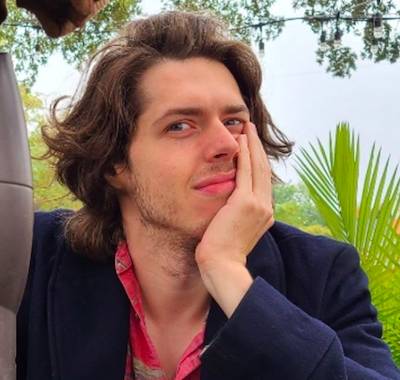From Abbey Road to “Alien: Earth”: Composer Jeff Russo on Bringing Xenomorphs Home Through Music
Alien: Earth doesn’t rehash the familiar, even if it beats with the acid-pumping heart of Ridley Scott’s original Alien. The series expands on the terrifying world Scott first unleashed on audiences on May 25, 1979 by focusing not only on the iconic Xenomorph, one of the most legendary movie monsters of all time, but by imagining what the world might look like decades later when the Xenomorph, and a slew of other captive galactic creatures, are brought down to a rapidly changing, capitalist-facsist Earth. The series comes from a man who has already taken a beloved film and turned it into a sprawling world, Fargo creator Noah Hawley. There’s little in the way of nostalgia – only faithfulness and creative freedom. It’s heard in composer Jeff Russo’s score alone, as well as in the rock songs from music supervisor Maggie Phillips.
Alien: Earth, true to its title, is a chapter largely set on Earth, which is another rarity for the franchise. possibleSydney Chandler) is a dying girl whose consciousness is placed in a synthetic body, a feat made possible by the talented, narcissistic “boy genius” (Samuel Blenkin) and his company, Prodigy. Even the protagonist of the story is an alien to our world, which welcomes the infamous Xenomorph and a wide variety of new aliens to our shores after a Weyland-Yutani ship crash lands on our planet. Unlike in space, on Earth, people can hear you scream.
Hawley’s long-time collaborator, Russo, looked at scoring Alien: Earth as an eight-hour film. There are over three hours of music on the soundtrack, bursting with organic string instruments and an elegant brokenness. Recently, Russo spoke with The Credits about composing a new sound for the Alien universe.
For the song “Xenomorph,” how did you want to communicate the alien’s inner life?
Xenomorph is a catchall piece of music that was basically meant for anything alien. It is more of a study in the tension between beings, because are they evil, or are they misunderstood, or are they protecting themselves? In the Alien franchise, you never know. There’s no way to know what they’re thinking. I needed to study that idea in music, and that’s what that piece really is in my brain.
What about Wendy’s thought process? How’d that shape her childlike theme?
With Wendy, I had to dive into the feeling of the transition as well: what she was before and what she became. She evolves as a being, whatever that being may be. Transition and evolution, that’s what that piece of music is. It discovers and studies her state of mind, which is tenuous. A lot of push and pull. Sometimes she feels comfortable, and other times, she feels completely uncomfortable in this body.
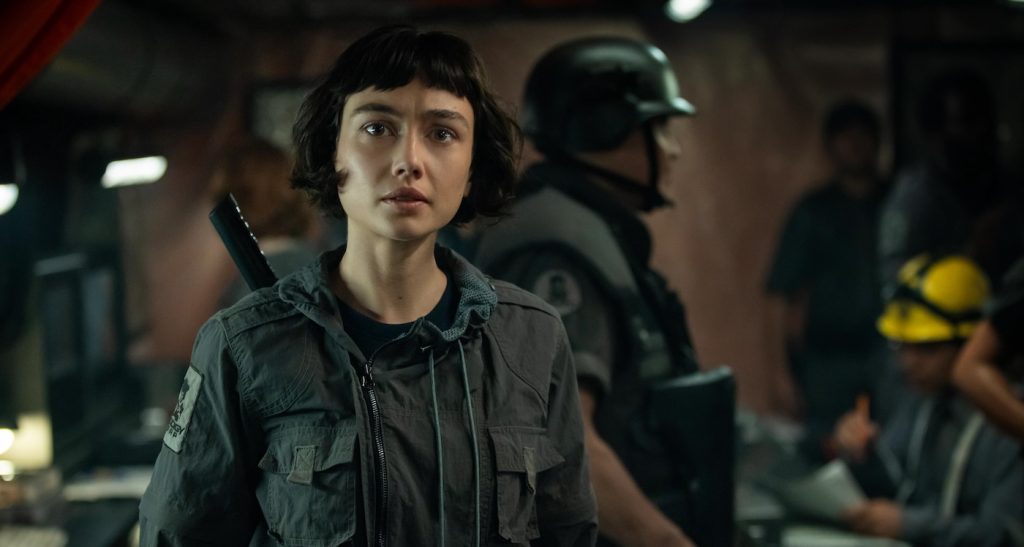
It’s funny hearing you say “push and pull.” In her theme, it sounds like innocence fighting horror.
And that’s what it is. It’s the push and pull against that. She evolves and realizes things about herself as the show continues.
How important is contrast in general when you’re composing?
Contrast is probably the most important thing in any narrative, because white is only white when there is black behind it — or vice versa. You need contrast to see, or everything would be blank. That’s how I look at it in terms of music. For something dark, you need to show the light in order to understand what the dark is — and the same thing in reverse. Contrast, in this particular case, is important. I need to show Wendy’s innocence in order to show what she will become.
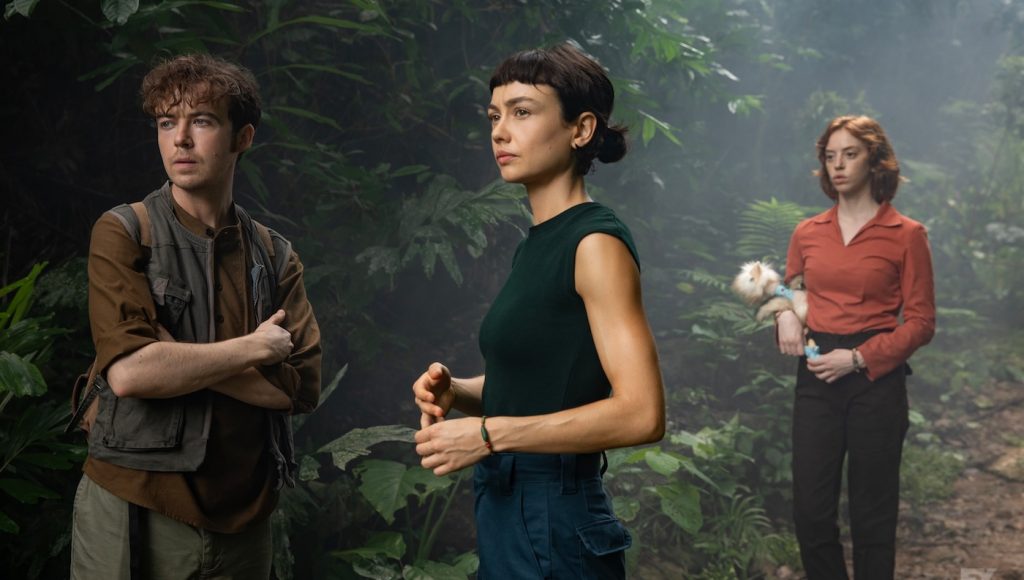
What about scoring Wendy’s relationship with her brother, Hermit (Alex Lawther)? How’d you want “Siblings” to, musically, bring them together when they reunite?
“Siblings” was a piece of music I wrote early on in the process. I’ve been writing music for this for about five years, and that piece of music has been tooling around in my head for three years. When I read the second and third scripts, I felt they needed some sort of musical moment — because I knew that was going to happen. The scripts had been changing as we were rolling through it, but I always knew there was going to be that moment, and what that moment felt like was going to be very important.
What was the first track you wrote five years ago? How’d it lay the groundwork for the rest of the score?
On the soundtrack, that piece of music is called “The Apartments.” That was one of the first pieces I wrote because I had gotten a script — or it wasn’t even a script, it was an outline. They were doing some VFX tests to see what the Xenomorph VFX would look like. Noah sent the outline to me and was like, “Can you do something here to help us along?” That piece of music is what I wrote for that. It was an earlier form than what you heard, but basically, that’s the piece.
Does Noah play your music on set to create atmosphere?
We did that on Fargo and Legion. I wrote these themes when he first sent me a script. He just sent me a new script for a new project, and I always tell him, “As soon as you send me a script, I have to hold off on reading it — because once I read it, I’m inspired to write. I have other stuff I have to finish before I start something new.” So, I wrote a bunch of music prior to him shooting, and he had it and was listening to it.
A great element of the Alien franchise is the flaws and the filth of the future, despite the incredible technology they possess. For the score, did you ever want to create a similar atmosphere and embrace the messiness of humanity?
Well, I don’t pay attention to perfect performances pretty much anytime I’m putting a score together. I can’t think of anything that happened by accident. Everything was deliberate, but it is a very broken feeling, so there’s very emotional music in the score.
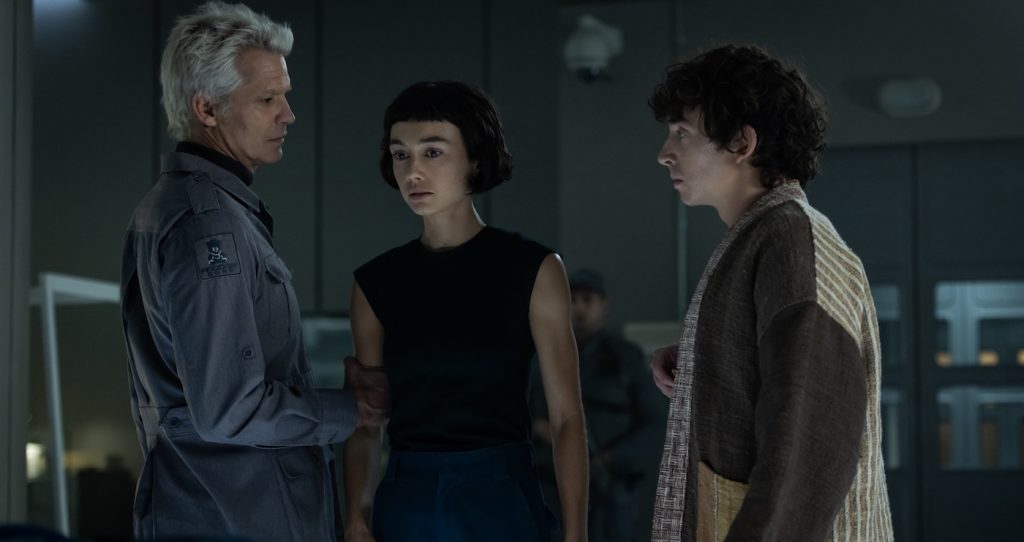
What did you want that brokenness to communicate?
Playing emotional music against the backdrop of something as cold is great for contrast. There’s also the idea that this narrative, this storytelling, has character connectivity we haven’t really seen in any of the Alien franchise movies — like the brother-and-sister storyline. One of my favorite scoring moments was when Hermit starts to believe that Wendy is his sister in episode two, and they hug. That’s an emotional watershed moment for the characters, and that’s not typical for Alien. Emotional music as a backdrop can be very effective, from a contrast perspective.
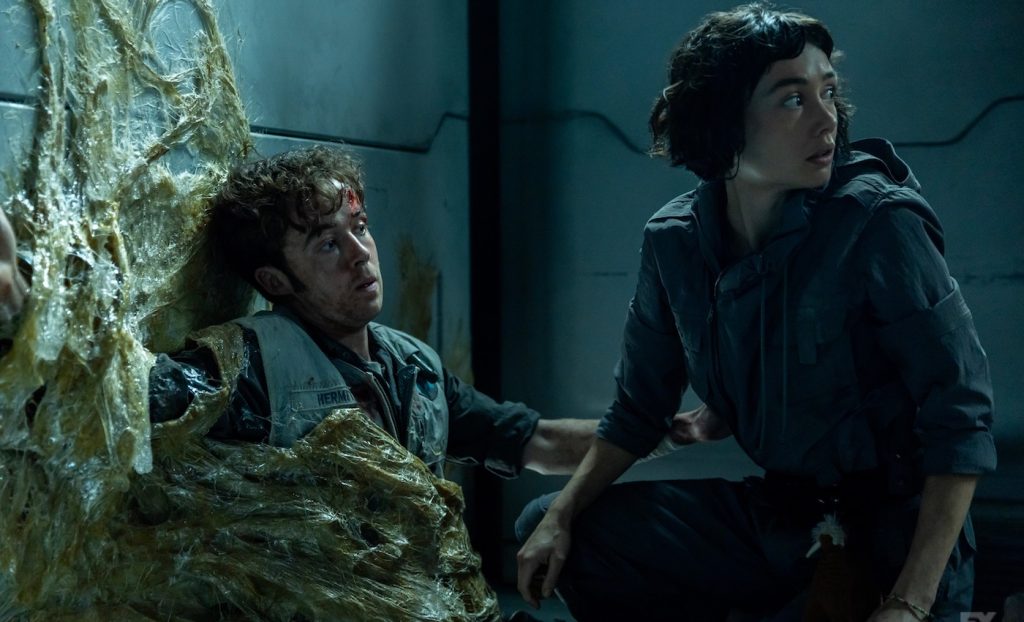
You have a “Let It Be” poster behind you, so when you were recording the orchestra at Abbey Road studios, what do you feel and hear when you’re there?
It’s very evocative of all the scores I loved growing up. When the strings played, or when the brass and winds played, you could hear echoes of those scores — echoes of previous music that’s been made there — because the room is so unique. It’s a unique-sounding space. I recorded in both studios there, Studio One and Studio Two. They’re iconic. I also recorded a little bit at Air Studios, which is the other major scoring stage in London. I don’t really know how to explain it, but it’s an incredible feeling to be in that studio.
You’ve said that the Alien: Earth score presented you with several new opportunities as a composer. Which new territory was gratifying for you to explore?
I’m always really interested in dissonance, and in this score, there’s a good amount of it. I’m fascinated by how dissonance affects people, because it hits different listeners in different ways. Emotional music affects most people in the same way — it’s the same with scary music. But when you talk about true dissonance, like notes that shouldn’t go together but you put them together to make that weird sound, I’m always interested in how that affects people’s psyches. I did a lot of thinking about that in the making of this score and how to utilize it. A lot of the score lulls you into a sense that everything’s okay, and then gradually turns that on its head to unease.
Alien: Earth is now streaming on Hulu.
Featured image: FX’s Alien: Earth — “Metamorphosi” — Season 1, Episode 3 (Airs Tues, August 19) — Pictured: Timothy Olyphant as Kirsh. CR: Patrick Brown/FX


